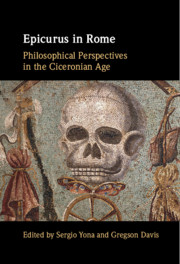Book contents
- Epicurus in Rome
- Epicurus in Rome
- Copyright page
- Contents
- Illustrations
- Contributors
- Acknowledgements
- Chapter 1 Introduction
- Part I Epicurus and Roman Identities
- Part II Epicurus and Lucretian Postures
- Chapter 7 “Love It or Leave It”: Nature’s Ultimatum in Lucretius’ On the Nature of Things (3.931–962)
- Chapter 8 Kitsch, Death and the Epicurean
- Chapter 9 Page, Stage, Image: Confronting Ennius with Lucretius’ On the Nature of Things
- Chapter 10 Lucretius on the Size of the Sun
- Bibliography
- General Index
Chapter 9 - Page, Stage, Image: Confronting Ennius with Lucretius’ On the Nature of Things
from Part II - Epicurus and Lucretian Postures
- Epicurus in Rome
- Epicurus in Rome
- Copyright page
- Contents
- Illustrations
- Contributors
- Acknowledgements
- Chapter 1 Introduction
- Part I Epicurus and Roman Identities
- Part II Epicurus and Lucretian Postures
- Chapter 7 “Love It or Leave It”: Nature’s Ultimatum in Lucretius’ On the Nature of Things (3.931–962)
- Chapter 8 Kitsch, Death and the Epicurean
- Chapter 9 Page, Stage, Image: Confronting Ennius with Lucretius’ On the Nature of Things
- Chapter 10 Lucretius on the Size of the Sun
- Bibliography
- General Index
Summary
This paper reexamines the intertextual connection between Lucretius and Ennius from a multi-medial angle. Ennius’ tragedies were regularly revived in the late Republic, and selections from his epic Annals appear to have been recited in public contexts as well. These performances seem to have stood in a relationship of reciprocal influence with wall paintings, as stagings inspired painters, and their artwork influenced actors in turn. Accordingly, Lucretius treats Ennius’ works as particularly influential expressions of a harmful philosophy that threatens Epicurean ataraxia in a variety of contexts. Analyzing familiar points of contact between the two authors in Book One of On the Nature of Things and highlighting a number of as-yet undiscussed allusions, I argue that Lucretius equips his readers with the tools to challenge Ennius in all three of the relevant media, be it on the page, on the stage, or in images.
Keywords
- Type
- Chapter
- Information
- Epicurus in RomePhilosophical Perspectives in the Ciceronian Age, pp. 147 - 167Publisher: Cambridge University PressPrint publication year: 2022

